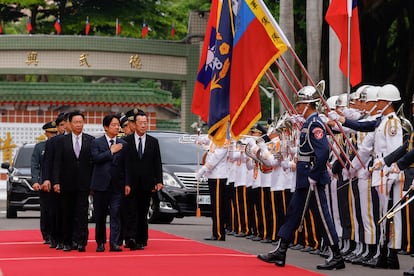China threatens ‘diehard supporters’ of Taiwanese independence with death penalty
Taipei described the move as ‘a crude provocation’ and urged its citizens, over whom Beijing has no jurisdiction, ‘not to be threatened or intimidated by the Chinese Communist Party’


China has threatened to impose tough sentences, including the death penalty, for “diehard supporters” of Taiwanese independence. According to guidelines issued jointly by the highest judicial authorities and the Chinese government and reported by state media, this would be the maximum sentence in the most extreme cases among those who pursue secessionism for the island. The guidelines, which came into force upon their publication Friday, represent an additional pressure point against the democratic island, but the government of Taipei immediately responded that they will have no effect as Beijing has no jurisdiction over its territory. It is “a crude provocation,” the Taiwanese authorities said.
The new guidance comes a month after Lai Ching-te, whom China describes as a separatist who “endangers” peace in the Strait, was sworn in as Taiwan’s president. His inauguration speech, in which he stated that the Republic of China (Taiwan’s official name) and the People’s Republic of China “are not subordinate to each other,” aroused Beijing’s anger, which responded with military maneuvers around the island.
Under the “one-China principle,” the Asian giant considers Taiwan an inalienable part of its territory and treats it as a rebellious province, which it intends to unify peacefully, although Beijing has not ruled out the use of force if necessary. The maneuvers following Lai’s speech were aimed at “safeguarding China’s sovereignty and territorial integrity and effectively punishing secessionist activities,” Chinese foreign spokesman Wang Wenbin said at the time. Taiwan deplored the “provocation” that threatened “the status quo of regional peace and stability.”
The new guidelines call on courts, procuratorates, public security, state security and administrative organs to “severely punish Taiwan independence diehards for splitting the country and inciting secession crimes in accordance with the law.” The text asserts that “a very small number” of separatist stalwarts have carried out secessionist activities “which seriously jeopardize peace and stability in the Taiwan Strait and seriously harm the common interests of compatriots on both sides of the Strait and the fundamental interests of the Chinese nation.”
The guidelines define criminal acts of dividing the country as “initiating or establishing Taiwan independence separatist organizations, carrying out separatist actions, or attempting to change Taiwan’s legal status as part of China through amendments to Taiwan regulations or referendums.” They also contemplate offenses such as advocating Taiwan’s entry into international organizations limited to sovereign states, or engaging in official exchanges and military contacts abroad with the aim of creating “two Chinas” or “one China, one Taiwan” in the international community. It will also be considered criminal conduct to distort or falsify facts about Taiwan’s historical links to China in areas such as education, culture, history and the media, or to suppress political parties, groups or individuals who support peaceful cross-strait relations and national unity, according to the document.
Life imprisonment
The text adds that ringleaders or those who commit relevant crimes may be handed life imprisonment or a prison sentence of more than 10 years. “Those who cause particularly serious damage to the state and the people,” it adds, “may be sentenced to death.” Meanwhile, those who are only considered “active participants” could face prison terms of between three and 10 years. The new guidelines have been drawn up in accordance with China’s anti-secession law (2005) and the Chinese penal code, state media stressed.
“The Beijing authorities have absolutely no jurisdiction over Taiwan, and the Chinese communists’ so-called laws and norms have no binding force on our people,” Taipei said in response, through a statement issued by the Mainland Affairs Council, the body in charge of cross-strait issues, as reported by Reuters. “The government appeals to our country’s people to feel at ease and not to be threatened or intimidated by the Chinese Communist Party.”
Sign up for our weekly newsletter to get more English-language news coverage from EL PAÍS USA Edition
Tu suscripción se está usando en otro dispositivo
¿Quieres añadir otro usuario a tu suscripción?
Si continúas leyendo en este dispositivo, no se podrá leer en el otro.
FlechaTu suscripción se está usando en otro dispositivo y solo puedes acceder a EL PAÍS desde un dispositivo a la vez.
Si quieres compartir tu cuenta, cambia tu suscripción a la modalidad Premium, así podrás añadir otro usuario. Cada uno accederá con su propia cuenta de email, lo que os permitirá personalizar vuestra experiencia en EL PAÍS.
¿Tienes una suscripción de empresa? Accede aquí para contratar más cuentas.
En el caso de no saber quién está usando tu cuenta, te recomendamos cambiar tu contraseña aquí.
Si decides continuar compartiendo tu cuenta, este mensaje se mostrará en tu dispositivo y en el de la otra persona que está usando tu cuenta de forma indefinida, afectando a tu experiencia de lectura. Puedes consultar aquí los términos y condiciones de la suscripción digital.








































